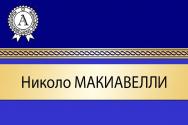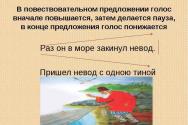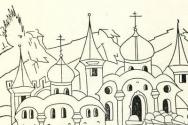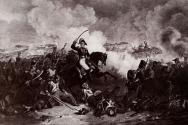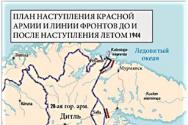“My Donetsk region, my life...My heart.” in poems by fellow countrymen poets
Lesson #3
Topic: Our famous fellow countrymen.
Goal: -Introduce children to famous fellow countrymen. Teach children to follow the example of such people;
Instill patriotic feelings, strengthen feelings of pride and dignity
To foster a sense of pride for our Motherland and its outstanding sons.
Lesson type: learning new material.
During the classes
Organizing time
Invented by someone, simply and wisely,
When meeting, greet: “Good morning!”
- Good morning to the sun and birds!
- Good morning to smiling faces!
And everyone becomes kind, trusting,
AND Good morning lasts until evening.
Teacher: I wish you all that a good and sunny mood will accompany you throughout the lesson.
Learning new material.
Donbass is written about in geography,
That Donbass is a land of coal and metal.
Right. But for full biography
It's very dry, very little.
It seems there is a song about Donbass,
Waste heaps and copra are sung.
That's right, there are some. I agree.
These are just external signs.
Well, where are the people? They are not visible...
That's why I'm sad and offended...
Donbass is famous people who glorified our region beyond its borders.
Be a patriot of the country,
The glorious path is paved with legend!
Don't forget history
The victories are glorious, big.
And be able to understand for yourself -
Who should we take as an example for life?
Teacher. In our region, in the Donetsk region, many people were born who later became famous throughout the world. They have made a huge contribution to the development of many industries. They were awarded high awards for their high achievements in various fields. Let's name some of them.
Microphone method Tell us about your fellow countryman.
Sergey Shemuk
In August 1935, in one shift at the mine, Alexey Stakhanov managed to extract 102 tons of coal, with a norm of 7 tons. 75 years later, in the city of Dzerzhinsk, Donetsk region, his record was broken by almost double the margin. The author of the record is the famous miner of the Novodzerzhinsk mine Sergei Shemuk, who produced 170 tons of coal in one shift. In one working day, he exceeded the plan for the entire site, which usually employs about 20 people, and at the same time exceeded the production plan by 2023%. Sergey Shemuk is the youngest honored miner of Ukraine, as well as a Hero of Ukraine, a full holder of the “Miner’s Glory” and “Miner’s Valor” badges.
The strongest man
Dmitry Khaladzhi
Donetsk hero Dmitry Khaladzhi is one of the most strong people planet and the only person in Ukraine capable of setting five records in one hour. Khalaji can lift five pounds with one hand, performs a “cross” with weights on his little fingers and presses two weights in one hand. Khalaji's signature trick is to tie several 20-centimeter nails in a knot in a minute. One of Dmitry’s famous feats is breaking the record of the ancient Greek athlete Bibon, who lifted a projectile weighing almost 144 kg with one hand. The shell has survived to this day, but perhaps only Dmitry can lift it. Khalaji made his own projectile weighing 152 kg and lifted it with one hand, twice - the second time for those who did not have time to take a photo.
Bird Man
Sergey Bubka
One of the most famous track and field athletes in the world, Sergei Bubka, was born in Voroshilovgrad (now Lugansk), but made his sports career in Donetsk and thereby adorned the constellation of the Donetsk sports galaxy. The harmonious development of strength, speed and technique turned Sergei into a champion who set record after record throughout his entire sports career. Sergei set 35 world records, and his achievements were in high jump (6 m 14 cm in an open stadium and 6 m 15 cm in a hall).
Solovyanenko Anatoly Borisovich (09.25.1932) - singer, People's Artist of the USSR (1975), laureate of the Lenin Prize (1980). Since 1965 Worked at the Ukrainian Opera and Ballet Theater.
Kobzon Joseph Davidovich (09/11/1937) was born in the city of Chasov Yar, Donetsk region, People's Artist of the USSR (1987), People's Artist of Ukraine (1991).
The list of our famous fellow countrymen can be continued endlessly. I hope that your names will one day glorify our Donetsk region. There are many, many more names that can be listed of people who brought glory to the Donetsk region and glorified it throughout the centuries. These are the ones you already know:
Beregovoy Georgy – pilot-cosmonaut of the USSR
Solovyanenko Anatoly - singer, National artist USSR
Ponomarev Ruslan – World Chess Champion
Kobzon Joseph - singer, People's Artist of the USSR
Prokofiev Sergei – composer
Bykov Leonid – actor, director
Pisarev Vadim – People's Artist of Ukraine
Martynov Evgeniy – composer, singer
Sosyura Vladimir - poet
Stus Vasily – poet, dissident
Quiet Oleksa – human rights activist, dissident, public figure
Filaret – Patriarch of the Ukrainian Orthodox Church of the Kyiv Patriarchate
It is necessary to name those who brought glory not only to Donbass; metallurgist Makar Mazai; tractor driver Pasha Angelina and many others.
Lesson summary. Teacher: Yes, Donbass is our homeland. We love her, we are proud of her. Maybe the poetic word is more capable of singing and glorifying Donbass. The poetry of Vladimir Sosyura, our fellow countryman, who was born here, reflects the feelings of each of us, and we say with an exciting heart: “Donetsk region, you are the land of my ancestors, and my land. I feel your warmth, your care. I am your child, I am combined with you."
Teacher: Outstanding people surround us everywhere. These are the workers of our city
Yes! Our land is truly rich in talents. Each of you carries within you a grain of talent from your native Donbass land. You have a great bright future ahead of you. And what it will be like depends only on you. Go for it! Be brave and persistent, conquer the peaks and create glorious stories in our region. You guys are the heirs of our city: its history, its culture, all those riches that were created by the hands of older generations. You must multiply its traditions, work in its fields, write poems and songs about it.
People should not forget their history, their roots. The memory should be kept in everyone's heart.
Vladimir Ivanovich Dal (1801-1872)
Russian scientist, writer and lexicographer, compiler Explanatory dictionary living Great Russian." Vladimir Dahl was born in Lugansk in 1801 in the family of a doctor of the mining department, the Russified Dane Ivan Matveyevich Dahl (Danish: Johan Christian von Dahl). The pseudonym “Cossack Lugansky”, under which Vladimir Dal joined literary world in 1832, was taken by him in honor of his homeland.

Nikita Sergeevich Khrushchev (1894 - 1971)
First Secretary of the CPSU Central Committee, Chairman of the Council of Ministers of the USSR. Hero Soviet Union, three times Hero of Socialist Labor. From 14 to 35 years old he studied and worked in Yuzovka (Donetsk). The period of Khrushchev's reign is sometimes called: many political prisoners were released, and compared to the period of Stalin's reign, the activity of repressions decreased significantly. The influence of ideological censorship has decreased.

Mikhail Lvovich Matusovsky (1915-1990)
Soviet songwriter. Laureate of the USSR State Prize, author of the legendary verses of the song “Moscow Evenings”, “Where the Motherland Begins” and dozens of other popular ones. Born in Lugansk, studied and graduated from the 13th secondary school in Lugansk. He would later dedicate his song “School Waltz” to his first teacher, Maria Semyonovna Todorova.

Georgy Timofeevich Beregovoi (1921 - 1995)
Georgy Beregovoy- pilot-cosmonaut of the USSR, twice Hero of the Soviet Union (the only one who was awarded the first Hero star for, and the second - for space flight).
Honored Test Pilot of the USSR, Lieutenant General of Aviation, Candidate of Psychological Sciences, USSR Cosmonaut No. 12. Born in 1921 near Poltava, soon after his birth the family moved to the city of Yenakievo in the Donbass. In 1941 he graduated from the Voroshilovgrad School of Military Pilots. In 1968 he made a space flight on the Soyuz-3 spacecraft. He was the main consultant for the feature films “Moscow - Cassiopeia” and “Youths in the Universe”.

Anatoly Timofeevich Fomenko
Soviet and Russian mathematician, specialist in the field of multidimensional calculus of variations, differential geometry and topology, theory of groups and Lie algebras, symplectic and computer geometry, theory of Hamiltonian dynamical systems. Full member of the Russian Academy of Sciences, Russian Academy of Natural Sciences. The author of the sensational “New Chronology” - the concept that the existing chronology of historical events is incorrect. Born in 1945 in Stalino (Donetsk), he graduated from school in Lugansk.

Sergey Nazarovich Bubka (born in 1963 in Lugansk)
Soviet and Ukrainian pole vault athlete. The first person in the world to jump above 6 meters. Honored Master of Sports of the USSR, Olympic champion, 6-time world champion, European and USSR champion. At the age of 37, Bubka took part in the Olympic Games in Sydney (2000). IOC President Marquis Juan Antonio Samaranch called him the most outstanding athlete of our time.
* - abbreviation for “Donetsk coal basin”.
Donbass is a historically formed region, including the Donetsk, Lugansk, Dnepropetrovsk regions of Ukraine and the Rostov region of the Russian Federation.
The Donetsk coal basin was discovered at the beginning of the 18th century. Its industrial development began at the end of the 19th century.
**Emigration from Donbass 2014-2016. According to the Ministry of Social Policy of Ukraine, since 2014, 1.6 million displaced refugees from Donbass and Crimea have been registered. Experts also note that these figures do not correspond to reality, since not all refugee emigrants are registered.
***Vladimir Dal was born in the village of Lugansk Plant (now Lugansk) of the Yekaterinoslav Governorate, Russian Empire on November 10 (22), 1801 in the family of a doctor of the mining department Ivan Matveevich Dal and his wife Maria Khristoforovna, née Freytag.
His father, the Russified Dane Johan Christian Dahl (Dan. Johan Christian Dahl, 1764 - October 21, 1821), accepted Russian citizenship along with the Russian name Ivan Matveevich Dahl in 1799. He knew many languages, was a theologian and physician. His fame as a linguist reached Empress Catherine II, who summoned him to St. Petersburg to serve as court librarian. Johann Dahl later went to Jena, took a medical course there and returned to Russia with a doctorate in medicine. The Russian medical license reads: “Ivan Matveev, son of Dal, was awarded the 8th of March 1792 during an examination in the Russian Empire to manage medical practice.” Ivan Dal in St. Petersburg married Maria Khristoforovna Freytag, they had two daughters (Paulina and Alexandra) and four sons, one of whom was Vladimir Dal.
We dream that there will be peace in Donbass, and that this land will give Ukraine and the world more than one talented artist. On August 24, Independence Day, watch the concert on the Inter TV channel “Dream of Ukraine”, organized with the support of the Federation of Employers of Ukraine.
These people were not afraid to dream...
- Leonid Bykov
Born in 1928 in the village. Znamenskoye, now Donetsk region
Leonid Bykov / Film “Only “old men” go into battle”
He dreamed of becoming a pilot, but because of his short stature he was expelled from flight school. But Leonid Bykov realized his dream when he shot the film “Only Old Men Go to Battle,” where he played, perhaps, his main role as Captain Alexei Titarenko, “Maestro.”
Leonid Bykov also starred in the films “Maxim Perepelitsa”, “Volunteers”, “Alien Relatives”, “Aty-Bati, the Soldiers Came”, “Aleshkina’s Love”, etc. Almost every role of his was iconic and brought him people’s love.
Born in 1925 in the village. Konstantinovka, now Donetsk region

Nonna Mordyukova / liveinternet.ru
People's Artist of the USSR Nonna Mordyukova dreamed of acting in films since childhood. Having seen the film “Bogdan Khmelnitsky” as a girl, she fell in love with the main character played by Nikolai Mordvinov and decided to become an actress. I wrote him a letter, asking: “How can I study for Lyubov Orlova? (note – famous Soviet actress)" In June 1941, when the war was not yet known, the famous actor replied: “Be sure to finish school, get a certificate and come to Moscow, find me.” During the war, Nonna Viktorovna’s family had to endure the occupation of Nazi Germany, she was unable to evacuate, and the family was forced to hide from the Germans. But even these events could not kill the dream of becoming an actress. After the end of the war, Mordyukova entered VGIK without preparation. Nonna Mordyukova’s first role was Ulyana Gromova in the film “Young Guard”. After this tape, the actress woke up famous.
Today Nonna Mardyukova is included in the top twenty most outstanding actresses of the 20th century by the editorial board of the British encyclopedia “Who is Who” (“Who is Who”)
Born in 1972 in Donetsk

Olga Lomonosova / youtube.com
The star of the famous series “Don't Be Born Beautiful” Olga Lomonosova fulfilled the dream of her mother, who dreamed of becoming a ballerina.
After graduating from the Kiev Choreographic School, Lomonosova moved to Moscow, where she toured a lot. But due to injury, she was forced to end her career as a ballerina. Life didn’t end there: Olga entered Shchukinskoe drama school. People began to recognize her on the street after her role as Kira in the TV series “Don’t Be Born Beautiful.” Now she is one of the most sought-after actresses. She hopes that her daughter will fulfill her dream of becoming an artist.
- Alexander Revva
Born in 1974 in Donetsk

As a child, Alexander Revva dreamed of becoming a magician. But the first job of the now famous showman and comedian was working as an electrician in a mine. “After ninth grade, I went to technical school and received the specialty “Underground electrician of the fourth category. I worked in a mine at a depth of 1375 meters. I will never forget! After that, I realized that a miner is a very difficult and dangerous profession. You are walking along the drift, you can’t see anything, your horse race is on fire, there is no air, there is coal dust. Then, when you get up, you only have eyes!” - says Revva.
Thanks to his talent and successful performances at the KVN games, Alexander still managed to realize his dream - to surprise people from the stage. In his repertoire there is a number where Alexander plays the magician Gennady.
Born in 1897 in Debaltsevo, now Donetsk region

Vladimir Sosyura / wikimedia.org
The famous Ukrainian poet Vladimir Sosyura dreamed and fought for the independence of Ukraine. Despite censorship and political persecution, the poet was not afraid to write poems that were bold for his time, for which he was more than once accused of nationalism. One of his most famous poems was the poem “Love Ukraine,” which was written in 1944.
To love Ukraine like the sun, to love,
like the wind, and the grass, and the water...
In a happy time and in joy,
to love in times of misfortune. To love Ukraine in dreams and in reality,
cherry your Ukraine,
beauty, I live forever and new,
And I love and the nightingale. Between brotherly peoples, in our redberry garden,
shining over the eyelids...
Love Ukraine with all your heart
and in all our affairs. For us there is one thing in the world, one
in the vastness of licorice charm...
Over there by the mirrors, and by the willows,
and a shock to the skin's heart,
Born in 1932 in Donetsk

Anatoly Solovyanenko / moskva.fm
Well-known Opera singer, Hero of Ukraine Anatoly Solovyanenko dreamed of becoming a singer and spent his whole life improving his talent. Singing came first for him. Solovyanenko often repeated: “I am a slave to my voice.”
In 1990, among 14 world-famous tenors, Anatoly Solovyanenko takes part in a concert dedicated to the 100th anniversary of the birth of the great Italian tenor Beniamino Gigli, held in Verona on the stage of the Arena di Verona.
Today in Donetsk the Donetsk State Academic Opera and Ballet Theater is named in honor of Anatoly Solovyanenko.
- Sergey Sivokho
Born in 1969 in Donetsk

The road to the world of show business was given to Sergei Sivokha by his comedic talent and KVN, which allowed itself to be shown. Perhaps, otherwise, Sergei Anatolyevich would have had to work in the specialty “metal forming,” which he received at the Donetsk Polytechnic Institute.
One of his most famous projects was the program “ Hidden camera", thanks to which many fell in love with the original and colorful presenter Sivokho. Sergei Sivokho is an ardent fan of FC Shakhtar Donetsk and dreams of living to see his favorite team win the Champions League.
- Sergei Prokofiev
Born in 1891 in the village of Sontsovka (now the village of Krasnoe, Krasnoarmeysky district, Donetsk region of Ukraine)

S.S. Prokofiev and M.L. Rostropovich in Prokofiev's office. Moscow, 1952/virtual.glinka.museum
The most performed composer of the twentieth century, Sergei Sergeevich Prokofiev, was born 55 km from Donetsk. From his very birth, the parents of the future great musician dreamed of him achieving success and contributed in every possible way to his musical development, despite the difficulties of that time.
Sergei Prokofiev has long been recognized as a genius in Europe and America, and festivals are regularly held in Ukraine classical music"Prokofiev's Spring".
Born in 1877 in the village of Verkhne-Khanzhenovsky, Russian Empire (now the village of Khanzhenkovo in the city of Makeevka, Donetsk region)

Alexander Khanzhonkov / proza.ru
Alexander Khanzhonkov is the founder of Russian cinema, one of the first who began not only to film, but also to earn big money from cinema. After being discharged from the army, Khanzhonkov invested the considerable payment of 5 thousand rubles required in those days into the film business. At first, he and his partners were involved in the distribution of foreign films. Then Khanzhonkov began producing his own films. He was the producer of the world's first film created using the method of volumetric animation, called “War of the Horned Men with the Barbels.”
One of the most famous “blockbusters” of those times was Khanzhonkov’s film about the defense of Sevastopol during Crimean War. To film the battle scenes, the help of Emperor Nicholas II was needed. Thanks to the emperor, real military units of the Russian army and a real ship, which according to the script would be sunk, were filmed.
Born in 1979 in Donetsk

Yulia Filippova / todes.lv
Soloist of the famous dance group“Todes” Yulia Filippova came to her fame thanks to hard work and luck. 12 years of pair acrobatics allowed the dancer to express herself and attract attention. “I worked in the Donetsk restaurant Tallinn, in the show ballet Dance Atelier. I had solo acrobatic performances there. The guys from Todes, who were in Donetsk on tour with Valery Leontyev, saw me. And they offered to come to Moscow for viewing. I arrived and they took me,” says Yulia Filippova.
Some time ago, Filippova left the stage due to a back injury and the birth of a child, but last year she found the strength to return, continuing to win the sympathy of the audience.
Our fellow countrymen who played a historical role in the formation of the DPR
Our homeland is the cradle of heroes, a fiery forge,
where simple souls melt, becoming strong
like diamond and steel.
A. N. Tolstoy
We will introduce you to representatives of government and public organizations,
participants in hostilities, famous citizens of the republic
Zakharchenko Alexander Vladimirovich
- Golden Star of the Hero of the Donetsk People's Republic
- Order of Valor, 1st class, of the LPR “for services during the joint operation of the LPR and DPR forces to eliminate the Debaltseve bridgehead
- Order of Friendship of the Republic of South Ossetia (2015).
- Other orders of the DPR
Alexander Vladimirovich Zakharchenko- Head of the Donetsk People's Republic, Chairman of the Council of Ministers of the DPR and Supreme Commander-in-Chief of the Armed Forces of the DPR.
Born on June 26, 1976 in Donetsk. Mother is Russian, father is Ukrainian. Married. Raises four sons.
After graduating from school No. 4 of the city of Donetsk in 1991, Alexander Zakharchenko continued his studies at the Donetsk College of Industrial Automation, specializing in “mining electrical mechanics”. Graduated from technical school with honors.
Alexander Zakharchenko’s first place of work was a mine, where he became a fifth-class electrician. Entered the Donetsk Law Institute of the Ministry of Internal Affairs.
After working as an electrical mechanic for 1.5 years, A. Zakharchenko began entrepreneurial activities related to the coal industry.
In 2010, a branch of the Kharkov branch was created in Donetsk public organization“Oplot”, headed by A. Zakharchenko. The goal of "Oplot" is to provide social, financial, legal and psychological assistance to the families of police officers who died while performing their duties. “Oplot” also helped disabled soldiers. Members of the organization actively fought against the glorification of the UPA. “Oplot” monitored the maintenance of the monuments of the Great Patriotic War in proper condition.
In 2014, Alexander Zakharchenko took an active part in the struggle for freedom and independence of the Donetsk People's Republic.
After the so-called “Euromaidan” in Kyiv in the winter of 2013-2014. and the subsequent illegal change of power, Alexander Zakharchenko took a tough position and joined the militia forces that were beginning to form at that time, protesting against the coup in the country. Zakharchenko’s main task for himself was to return to the residents of Donbass the opportunity to determine their own future, government structure, decide in which country they should live, what language they speak.
In the spring of 2014, on April 16, Alexander Zakharchenko led a group of 7 armed people who occupied the building of the Donetsk city administration.
After the referendum on independence of the DPR on May 11, 2014, Zakharchenko first became the military commandant of Donetsk, and later the deputy minister of internal affairs of the republic.
Personally participated in battles in the Donetsk region. At the end of May 2014, during the storming of Donetsk International Airport. Prokofiev Alexander Zakharchenko was wounded in the leg. A month later, Zakharchenko received the military rank of major.
In August 2014, the Prime Minister of the Donetsk Republic, Alexander Borodai, resigned. In his place, deputies of the Council of the Republic appointed Alexander Zakharchenko. This decision was made almost unanimously. On the same day, Zakharchenko took the oath of allegiance to the people of the Republic and began to fulfill his duties.
In October 2014, Alexander Zakharchenko submitted documents to the DPR Central Election Commission as a candidate for the post of Head of the Donetsk People's Republic, becoming the first registered candidate.
In February 2015, at the first congress of the Donetsk Republic OD, Alexander Zakharchenko was unanimously elected Chairman of the movement.
On February 17, 2015, he was wounded in the leg during the battles for Debaltsevo. For a successful military operation, deputies of the DPR parliament awarded Alexander Zakharchenko the title “Hero of the DPR” and the extraordinary military rank of “Colonel.” Also, after the liberation of Debaltsevo, Alexander Zakharchenko was awarded the rank of “Major General” of the Lugansk People’s Republic. This decision was made by deputies of the LPR parliament.
Despite being seriously wounded and a grueling rehabilitation course, he continues to exercise full leadership of the country and takes an active part in the construction of institutions state power.
Thanks to the efforts of Alexander Zakharchenko, it was possible to prevent a humanitarian catastrophe in the Donetsk People's Republic and an economic collapse caused by the blockade of the DPR by Ukraine.
In the fall of 2015, Alexander Zakharchenko signed a historic decree for the Republic “On calling elections to local government bodies” and thereby marked the completion of the stage of state building of the DPR in record time - in 1.5 years.
The pursuit
Zakharchenko is on the list of persons subject to the decree of US President Barack Obama on sanctions against Russia (published on December 20, 2014 by the US Department of the Treasury), as well as on the EU sanctions list (published on September 12, 2014).
In Ukraine, Zakharchenko is wanted by the SBU under Article 258-3, Part 1 of the Criminal Code of Ukraine (“creation of a terrorist group or terrorist organization”)

Denis Vladimirovich Pushilin
Chairman of the Presidium of the Supreme Council of the Donetsk People's Republic
Denis Vladimirovich Pushilin born on May 9, 1981 in the city of Makeevka, Donetsk region, graduated from the Lyceum there in 1998, after which he was drafted into the army. After completing his military service in the National Guard of Ukraine (1999 - 2001), Pushilin entered the Faculty of Enterprise Economics of the Donbass National Academy of Architecture and Construction. In parallel with his studies, Denis Pushilin began to work, which ultimately prevented him from obtaining a diploma of higher economic education.
From 2002 to 2010, his career was associated with the trading company “Sweet Life”. Later, in 2011-2013, Pushilin was a participant in the MMM movement, the reincarnation of Sergei Mavrodi’s project, initially as a volunteer and then as a member of the party of the same name. As part of the construction of a financial pyramid, Denis Pushilin managed to quickly become one of the leaders of MMM in Ukraine.
Pushilin did not support the new Maidan in Kyiv and participated in anti-Maidan actions, speaking on the side of the government. In the spring of 2014, he became active in the protest movement in the southeast of the country, and in April he was appointed deputy to Pavel Gubarev, the people's governor of Donbass. After Gubarev was taken under arrest, his power functions in Donetsk were performed by Pushilin.
On May 7, the Donetsk People's Republic was proclaimed, and when the interim government was formed, Denis Pushilin joined it. On May 15, he took the position of chairman of the presidium of the Supreme Council of the DPR, and on July 18, he resigned. Denis Pushilin is on the list of persons subject to EU and US sanctions. Since May 2, 2014, he has been wanted by the Security Service of Ukraine in connection with charges of separatism.

Pavel Yurievich Gubarev
Gubarev Pavel Yurievich- one of the leaders of the Russian Spring, head of the public organization "People's Militia of Donbass", politician, entrepreneur.
Born on March 10, 1983 in Severodonetsk, Lugansk region. Studied at high school No. 4 of the city of Severodonetsk. Graduated from the Faculty of History of Donetsk University. Worked in the advertising business. Founder of the Morozko companies, which organizes children's parties, and Patison, which deals with outdoor advertising.
Initially, Gubarev was a member of the Russian National Unity organization, which arose during the Orange Revolution, then joined the Progressive Socialist Party of Ukraine, from which he was elected deputy of the Kuibyshevsky district of Donetsk.
In 2006, he was the head of the public organization “European Choice”. In 2006-2007 - deputy of the Kuybyshevsky District Council, head of the Natalia Vitrenko Bloc “People's Opposition” faction in the council. In 2006, he took part in protests in Feodosia against NATO.
In 2007, he resigned his mandate.
In 2010, he was a confidant of the candidate for parliament from the Strong Ukraine party.
On March 1, 2014, at a rally in Donetsk, he was elected “people’s governor” of the Donetsk region. Supporters of Gubarev several times seized the building of the Donetsk regional administration and planted a Russian flag over it, but were then forced out of there by the police.
On March 6, he was arrested by SBU officers in his apartment in Donetsk. Gubarev was charged with Part 1 of Art. 109 of the Criminal Code of Ukraine (actions aimed at the violent change or overthrow of the constitutional order or the seizure of state power), Part 2 of Article 110 of the Criminal Code of Ukraine (encroachment on the territorial integrity and inviolability of Ukraine) and Art. 341 of the Criminal Code of Ukraine (seizure of state or public buildings or structures). The next day he was arrested by the Shevchenkovsky District Court of Kyiv for 2 months. Subsequently, the Russian Foreign Ministry declared Pavel Gubarev a political prisoner.
During his arrest, he was kept in the SBU pre-trial detention center and was subjected to repeated torture and abuse.
On March 9, 2014, a rally was held in Donetsk, which attracted about 3 thousand people, at which protesters demanded the release of Gubarev.
On April 25, Pavel Gubarev declared an indefinite hunger strike in protest against the “killings of civilians in Slavyansk.”
On May 7, 2014, Pavel Gubarev, deputy “people’s mayor” of Slavyansk Igor Perepechaenko and activist from the Kherson region Sergei Zlobin were released at a checkpoint in Slavyansk in exchange for three Alpha officers.
On June 2, 2014, Gubarev’s office in Donetsk in the building of the former Donetsk regional administration was fired from a grenade launcher. The attackers aimed at the office window, but missed.
In July 2014, he was appointed head of the mobilization department of the DPR Ministry of Defense. In September he announced that he had left this post.
On October 12, 2014, at about 21:00, an attempt was made on Pavel Gubarev. The Audi Q7 he was traveling in was shot at...

Andrey Evgenievich Purgin
Chairman of the People's Council of the self-proclaimedDPR
before that 1st Deputy Chairman of the Council of Ministers of the Republic
Andrey Evgenievich Purgin graduated from Maryinskaya basic secondary school. WITH early childhood was interested in history and politics. In 1989, he entered the Donetsk State Technical University at the Faculty of Automated Control Systems, majoring in Automation and Telemechanics.
In 2004 he opposed the Orange Revolution. Since 2005, he was a co-founder of the socio-political organization “Donetsk Republic”. The main goal of the members of the association was to provide special status to the eastern regions of Ukraine with the formation of the successor to the Donetsk-Krivoy Rog Soviet Republic of 1918.
On the night of February 22-23, 2005, the “Union Born of the Revolution” set up a tent city on Lenin Square in Donetsk. Then the protesters put forward 12 demands, including the federal structure of Ukraine and giving the Russian language the status of a second state language, but the Donetsk City Council challenged in court the legality of erecting tents by members of this organization, and already on March 1, the Voroshilovsky District Court of Donetsk ordered them to be closed.
On February 28, 2015, he was hospitalized with a suspected microstroke. Suspicions were confirmed on March 5.
On September 4, 2015, Purgin, who was returning from the Russian Federation, and the head of the secretariat of the People's Council of the DPR, Alexei Alexandrov, was blocked on the Russian border at the Uspenka checkpoint and was not allowed into the DPR for several hours. Later, they were nevertheless allowed through and detained at the entrance to Donetsk along with Aleksandrov’s wife and son Alexei, and handed over to the Ministry of State Security. On the evening of that day, it became known about Purgin’s resignation; his deputy Denis Pushilin received his position in the People’s Council. On September 5, he explained Purgin’s resignation by his falling under the influence of Alexandrov and the fact that he “made a number of political statements that ran counter to the policy of the entire state.”

Eduard Aleksandrovich Basurin
self-proclaimed military leaderDPR , Deputy Corps Commander of the Ministry of Defense of the Republic
Eduard Aleksandrovich Basurin born June 27, 1966 in Donetsk. After graduating from school in 1983, he entered the Donetsk Higher Military-Political School, which he graduated in June 1987. After graduating from college, he served in the army. Resigned in 1997.
From 1997 to 2002, he was director of a company producing VD plastic film.
In 2006-2010, he worked in a company producing PVC products, applying paints and varnishes to these products.
Its active political activity In the self-proclaimed Donetsk People's Republic, Eduard Basurin began in July 2014 as a political officer of the Kalmius special unit. In the fall of 2014, Basurin also became one of the coordinators of the confrontation in Donetsk. Later, the People's Council of the Donetsk People's Republic approved his candidacy for the post of deputy commander of the corps of the Ministry of Defense of the Republic for work with personnel.
The fighting lasted for a whole week, Tsar Kononov was in command. That’s why I supported his candidacy for the post of Minister of Defense - as a battalion commander he showed himself very well. He had a reinforced battalion. Four Slavic companies, my military police company, the Oplot armor group, batteries... He maneuvered all of them normally. Knocked out the 25th brigade, defeated it with fairly small losses on its part. at the Desna training center with a request to provide the People's Militia with vehicles for transporting the wounded. On October 28, Zhirinovsky sent a shipment of cars to the rebels "
Battalion "Somalia"
A volunteer formation taking part in military operations in eastern Ukraine on the side of the DPR in the defense of Slavyansk, in the battles for Ilovaisk and in the protracted siege and further successful assault on Donetsk airport during heavy fighting in September-October 2014.

Arsen Sergeevich Pavlov
(Motorola)
Arsen Sergeevich Pavlov (Motorola)- commander of the anti-tank special unit "Sparta" of the Donetsk People's Republic. Colonel of the DPR armed forces. Hero of the Donetsk People's Republic (February 21, 2015).
Born on February 2, 1983 in the city of Ukhta, Komi Autonomous Soviet Socialist Republic. In 2002, he left Ukhta and began serving in the Russian army.
In 2009, he completed an initial training course for rescuers at the Krasnodar Training Center of the Federal Fire Service. He also indicated knowledge of such professions as marble maker, granite maker and extruder. After that, he got a job as a worker at a car wash in Rostov-on-Don. Motorola himself, when asked why he ended up in Ukraine, answered as follows: “I took the train and arrived. Didn't get into it. The Russians are here, so I came. I’ve already said: as soon as Molotov cocktails flew at the police officers on the Maidan, it became clear to me - that’s it, this is war. After the Nazis declared that ten Russians would be killed for every one of their own, I didn’t see the point in waiting for the threat to become a reality.” Arsen Pavlov quickly found his place among like-minded people and even faster gained a reputation as active, brave and quick-thinking even in critical military situations.
Motorola was wounded several times. In January 2015, Arsen Pavlov’s name was added to the EU sanctions list. The military man was banned from entering EU countries. Just a month after this, Motorola was charged under the article “Violation of the laws and customs of war.”
For his courage and active work at the front, Motorola was awarded the St. George Cross of the Donetsk People's Republic and the Order of Military Valor, first degree.
On October 16, 2016, Arsen Pavlov was killed in the elevator of his building in Donetsk.
N. Izotov A. Stakhanov P. Angelina
Izotov Nikita Alekseevich(January 27 (February 9), 1902 - January 14, 1951) - miner worker, initiator of the Isotov movement for the mass training of young workers by cadre workers, one of the founders of the Stakhanov movement.
Nikita Alekseevich Izotov was born on January 27 (February 9), 1902 in the family of a peasant in the Oryol province. Since 1914, he worked as an auxiliary worker at a briquette factory in Gorlovka, then as a fireman at the Korsun Mine No. 1 - the future Kochegarka mine, and took part in the restoration of the mine after the Civil War.
Working as a miner at mine No. 1 "Kochegarka" (Gorlovka), he achieved high labor productivity, invariably fulfilling 3-4 standards. In 1932, the miner of mine No. 1 “Kochegarka” (Gorlovka) Nikita Alekseevich Izotov achieved unprecedented production, fulfilling the coal production plan in January by 562%, in May by 558%, and in June by 2000% (607 tons in 6 hours). Simple in its essence, Izotov’s method is based on a thorough study of the coal seam, the ability to quickly secure mine workings, clear organization of work, and keeping tools in order.
Alexey Grigorievich Stakhanov - innovator of the coal industry, founder of the Stakhanov movement, Hero of Socialist Labor.
Stakhanov Alexey Grigorievich born on December 21, 1905 in the village of Lugovaya, Oryol region. His working career began at the age of 12. Grandfather and father went south to earn money. When Alexey turned 21, he came to Donbass, with whom he linked his fate as a miner. He worked as a horse driver and then as a miner at the Tsentralnoye-Irmino mine in the Lugansk region (Kadievka).
Since 1933 Stakhanov Alexey Grigorievich worked as a jackhammer operator.
In 1935 Stakhanov Alexey Grigorievich He completed a miner's course at the mine. On the night of August 30-31, 1935, during a shift (5 hours 45 minutes) he produced 102 tons of coal at a rate of 7 tons, exceeding the rate 14 times and setting a record. According to the official version, the reason for the unprecedented achievement Stakhanov consisted of skillful use of a jackhammer, which in itself was a miracle of modern technology in those years.
Angelina Praskovya Nikitichna (Pasha Angelina) - one of the founders of socialist competition in agriculture, organizer and foreman of the first women's tractor brigade. Twice Hero of Socialist Labor. Author of the book about collective farm activists “People of Collective Farm Fields”
Born Angelina Praskovya Nikitichna December 30, 1912 (January 12, 1913) in the village (now an urban settlement) Starobeshevo, Stalin, now Donetsk region.
Angelina Praskovya Nikitichna one of the first women tractor drivers. Her name is included in the list of the most outstanding people of all countries.
In 1929 Angelina Praskovya Nikitichna She graduated from tractor driving courses and began working as a tractor driver at the Staro-Beshevsky Machine and Tractor Station (MTS).
In 1933, she organized a women's tractor brigade in this MTS and headed it.
In 1933-34, the women's tractor brigade took first place in MTS, fulfilling the plan by 129 percent. After that Pasha Angelina becomes the central figure in the campaign for women's technical education.


Makar Mazai Petr Krivonos
Makar Nikitovich Mazai(1910, Olginskaya village Krasnodar region– 1941, Mariupol) – steelmaker at the Mariupol Metallurgical Plant named after Ilyich, an innovative worker, initiator of the competition for high volumes of steel production. In 1930 he became a laborer at the Mariupol Metallurgical Plant. In 1935 – steelmaker of the open-hearth shop. In 1936, he was one of the founders of the high-speed steelmaking movement. The country was developing, and more and more steel was needed. Makar Mazai proposed a risky solution: to deepen the open-hearth furnace bath and at the same time raise the height of the open-hearth furnace roof. After this, it was possible to pour much more charge into the furnace than before. In October 1936, Makar Mazai set one after another records for steel removal from a square meter of furnace bottom with maximum result 15 tons in 6 hours 30 minutes. After this, his experience and methods of work spread throughout the country.
During the great years Patriotic War Makar Mazai did not have time to evacuate and remained in occupied Mariupol. He was captured and shot after prolonged torture for refusing to cooperate with the Germans.
Petr Fedorovich Krivonos born on June 29 (July 12), 1910 in the city of Feodosia in the family of a railway worker. In 1913, the family moved to the city of Slavyansk. After graduating from seven-year school, he worked as a mechanic in a locomotive depot. In 1926-1929 studied at the FZU school in the city of Slavyansk. In 1929, after graduating from college, he began working at the locomotive depot of Slavyansk, Donetsk railway. In 1935, as a locomotive driver, he was the first in transport when driving freight trains to increase the boost of the steam locomotive's boiler, due to which the technical speed was doubled, to 46-47 km/h. The name of Peter Krivonos is associated with the opening of the Children's Railway in Kyiv, in Syretsky Park. On August 2, 1953, on Railwayman's Day, children rode in blue and dark red carriages, and the first train was driven by the legendary Pyotr Krivonos. It was also on his initiative that the IS steam locomotive was placed on a pedestal at the city’s central station, which is currently the only complete representative of the series preserved.
Questions and tasks:
1. Why is the world’s first monument to a working man dedicated to miner N. Izotov?
2. Why is the achievement of miner Alexei Stakhanov called an “eternal record”?
3. How did the appearance of the tractor affect the fate of Pasha Angelina?
4. Why is steelmaker Makar Mazai called “the one who lights up the light”?
5. How did the driver Pyotr Krivonos “fly” on the rails instead of the sky?



